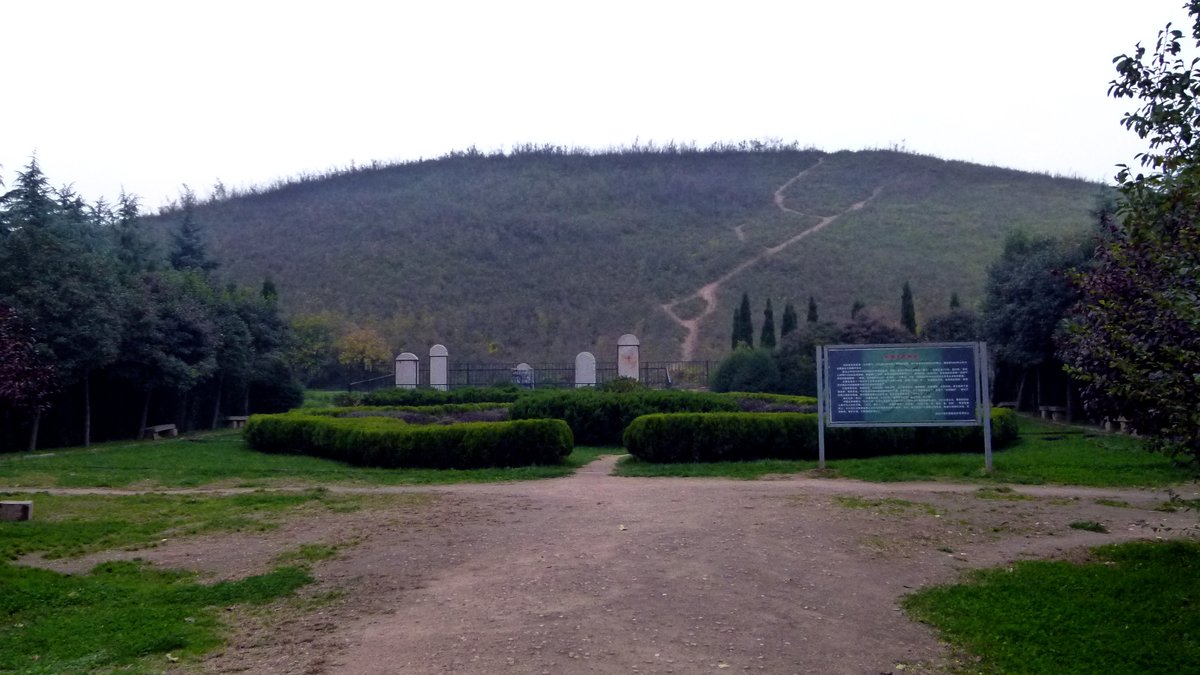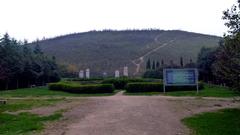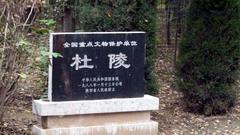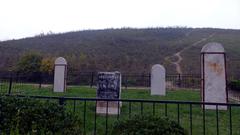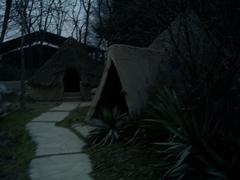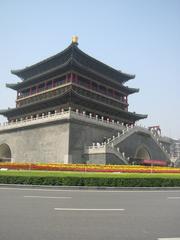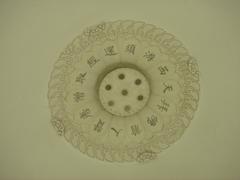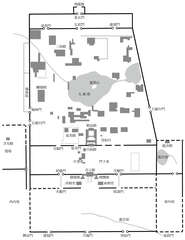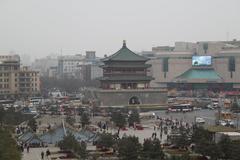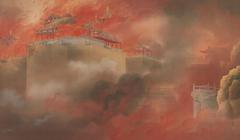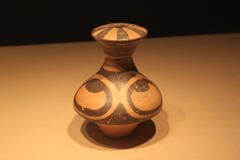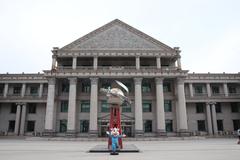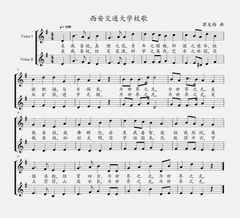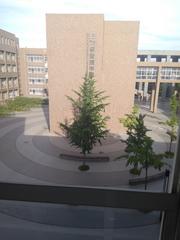Duling Mausoleum, Xi’an: Visiting Hours, Tickets, and Complete Travel Guide
Date: 15/06/2025
Introduction: Duling Mausoleum at the Heart of Han Dynasty Heritage
Situated on the southeastern outskirts of Xi’an, the Duling Mausoleum stands as a compelling testament to the grandeur and legacy of the Western Han Dynasty (206 BCE–8 CE). The final resting place of Emperor Xuan of Han (r. 74–49 BCE), Duling offers an immersive journey into ancient Chinese funerary customs, architectural mastery, and imperial ideology. As Xi’an (historically known as Chang’an) was the capital of several dynasties and the eastern terminus of the Silk Road, Duling is a vital part of this rich historical tapestry. The site’s monumental burial mound, satellite tombs, and museum displays reveal the artistry and cosmological beliefs of the Han era. Duling is a tranquil alternative to the city’s more famous attractions and a must-see for history enthusiasts, archaeology buffs, and cultural explorers. This guide provides comprehensive information on visiting hours, tickets, accessibility, and travel tips to help you make the most of your visit (xianprivatetour.com; ruqintravel.com; travelchinaguide.com).
Contents
- Introduction
- Historical Background
- Origins and Dynastic Context
- Emperor Xuan of Han: Life and Legacy
- Construction and Architectural Features
- Archaeological Discoveries
- Visitor Information
- Visiting Hours
- Tickets and Booking
- Accessibility
- Getting There
- Facilities
- What to See
- Main Burial Mound and Satellite Tombs
- Museum Exhibits
- Cultural Experiences
- Travel Tips
- Nearby Attractions
- Visual Resources
- FAQ
- Conservation and Responsible Tourism
- Summary and Recommendations
- Sources
Historical Background
Origins and Dynastic Context
Duling is the mausoleum of Emperor Xuan of Han (Liu Xun, 91–49 BCE), a pivotal figure in the Western Han Dynasty, a period marked by stability, expansion, and cultural flourishing. The mausoleum reflects traditional Han imperial burial practices, including monumental earth mounds and ritual complexes, designed in accordance with beliefs about the afterlife (xianprivatetour.com).
Emperor Xuan of Han: Life and Legacy
Emperor Xuan’s reign restored Confucian governance and stability after internal strife. His policies promoted economic recovery and cultural advancement, and his mausoleum symbolizes his respected rule and the values of his era (xianprivatetour.com).
Construction and Architectural Features
The Duling Mausoleum covers approximately 8 hectares. Its main burial mound, square in plan and rising around 30 meters, is surrounded by auxiliary tombs, ritual halls, and remnants of adobe walls and drainage systems. The site’s design aligns with Han cosmological principles and demonstrates advanced engineering (thebrainchamber.com).
Archaeological Discoveries
Excavations have revealed a wealth of artifacts, including pottery figurines, jades, bronzes, and lacquerware. Murals and stone reliefs depict ceremonial scenes and mythological creatures, offering unique insight into Han aesthetics and social hierarchy. Many finds are displayed at the Shaanxi History Museum (letstraveltochina.com).
Visitor Information
Visiting Hours
- Open daily: 8:30 AM – 5:30 PM (last admission at 5:00 PM).
- Hours may vary seasonally or for maintenance; verify before your visit (travelchinaguide.com).
Tickets and Booking
- General admission: 40–60 RMB
- Discounts: Available for students, seniors, and groups
- Purchase options: At site entrance or online via official platforms
- Guided tours: Offered in multiple languages and highly recommended
Accessibility
- Main pathways and museum areas are wheelchair accessible; some uneven ground near the burial mounds.
- Rental wheelchairs and assistance are available at the visitor center.
- Contact the site in advance for specific accessibility needs.
Getting There
- Public bus: Lines 10, 22, and 54 reach the vicinity; check current routes.
- Taxi/ride-hailing: 30–40 minutes from downtown Xi’an.
- Private tours: Many operators include Duling in Han tomb itineraries.
Facilities
- Restrooms and a small gift shop onsite.
- Limited food options—bring snacks and water, especially in warmer months.
What to See
Main Burial Mound and Satellite Tombs
Walk the grounds to appreciate the scale of Emperor Xuan’s burial mound and the surrounding tombs of family and officials. The spirit way, once lined with stone statues, evokes the ceremonial grandeur of the Han court.
Museum Exhibits
Onsite exhibitions and the Shaanxi History Museum display:
- Pottery figurines (attendants, soldiers, musicians)
- Jade burial objects and ceremonial bronzes
- Mural fragments and lacquerware
- Digital reconstructions and interpretive panels
Cultural Experiences
- Archaeology workshops for families and students
- Festivals and special events celebrating Han traditions (check event calendars)
Travel Tips
- Best time to visit: Spring (March–May) and autumn (September–November) offer mild weather and fewer crowds.
- Recommended duration: Allow at least half a day, especially if combining with other nearby sites.
- Dress comfortably: Wear walking shoes and bring sun protection.
- Photography: Allowed outdoors; flash is typically prohibited inside museum areas.
- Etiquette: Respect site rules—do not climb mounds or touch artifacts.
Nearby Attractions
- Han Yang Ling Mausoleum: Underground museum with terracotta figurines (Ruqin Travel)
- Banpo Museum: Prehistoric Neolithic site (TravelChinaGuide)
- Huaqing Hot Springs: Historic spa complex favored by Tang emperors
Visual Resources
- [Insert high-quality image: “Duling Mausoleum in Xi’an, Western Han Dynasty imperial tomb”]
- [Insert map: Location of Duling relative to central Xi’an]
- [Virtual tours and interactive maps available on the official Duling Heritage Park website]
Frequently Asked Questions (FAQ)
Q: What are the visiting hours for Duling Mausoleum?
A: 8:30 AM–5:30 PM daily, with last entry at 5:00 PM. Check for seasonal updates.
Q: How do I purchase tickets?
A: Online via official websites or at the entrance. Advance booking is recommended during busy periods.
Q: Is the site wheelchair accessible?
A: Main paths and museum areas are accessible, with some uneven areas outdoors.
Q: Are guided tours available?
A: Yes, in multiple languages; booking in advance is recommended.
Q: What other historical sites are nearby?
A: Han Yang Ling Mausoleum, Banpo Museum, Huaqing Hot Springs, Ancient City Wall.
Conservation and Responsible Tourism
Duling is protected as part of a national heritage park. Visitors are encouraged to:
- Follow all site regulations
- Avoid touching artifacts and murals
- Dispose of litter properly
- Support conservation through donations or volunteering
Preserving Duling ensures that future generations can experience this invaluable legacy.
Summary and Recommendations
Duling Mausoleum embodies the political, artistic, and spiritual essence of the Han Dynasty, adding depth to Xi’an’s status as a center of Chinese civilization. With accessible hours, affordable tickets, and insightful guided tours, Duling is a rewarding destination for travelers seeking an authentic historical experience. Utilize virtual resources, plan ahead for accessibility, and combine your visit with other local sites for a comprehensive Xi’an itinerary. By respecting conservation efforts, visitors contribute to the preservation of this extraordinary heritage (xianprivatetour.com; ruqintravel.com; travelchinaguide.com).
